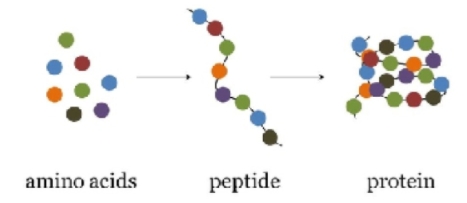Enjoy FREE Shipping on Orders Over $99
DON’T HAVE A COUPON CODE?
Use EZ10OFF At Checkout to Save 10% On Your Entire Order Today!
Why Protein Matters
We have all heard that we require it, but most of us do not understand protein. The word ‘protein’ is used to designate a structure created from chained amino acids. We typically use the word ‘protein’ in general when defining the needs of the body, but it is essential to understand the body is not designed to use and metabolize structures. The human body is designed to use only the simplest of compounds and bioavailable elements and must break down (digest) more complex structures into the elements that comprise them for the body’s needs.
Amino acids are the basic building blocks your body uses to make its own protein structures. Amino acids are used to make repairs, to create new structures, to enhance immune response, to act as transporters, provide structure to your internal organs, send messages between cells, and to serve a multitude of other purposes. Amino acids are called peptides and are sub-units made up of carbon, hydrogen, oxygen, nitrogen, phosphorus, sulfur, and iron.

Proteins are polypeptides-- chains of amino acids linked together like a beaded necklace. These chains can contain thousands upon thousands of amino acids. Your body has the ability to break down some proteins into amino acids, and rebuild amino acids into proteins, and both processes are important to your health.
However, as individual molecules, amino acids can contribute to the functions of your body independent of their integral role in proteins. For example, a subset of amino acids can convert to glucose for use as fuel during times you consume excess protein but too few carbohydrates. Other amino acids can convert to fatty acids for storage in your adipose tissue when you have more protein and calories in your diet than you need.
Essential Amino Acids
Because we don't store amino acids, our bodies access them in two different ways: either from scratch, or by modifying others. Nine amino acids—histidine, isoleucine, leucine, lysine, methionine, phenylalanine, threonine, tryptophan, and valine—known as the essential amino acids, cannot be made in the body, and must come from food.
Branched Chain Amino Acids (BCAAs), named for their chemical structure, are a subgroup of these essential amino acids: valine, isoleucine, and leucine. This trio is predominantly associated with muscle building and recovery benefits. BCAAs make up 40% of your total essential amino acid requirements, which can only be met through diet and supplementation. If they are not present at optimal levels, your body cannot synthesize the missing amino acids and you are missing out on maximizing your potential.
Whey protein has a unique amino acid profile with a very high nutritional value since it contains all 20 amino acids, including ALL of the nine essential ones! Whey protein is an easily assimilated rich source of BCAAs, (and glutamine) which explains why body builders and serious athletes prefer whey as their source of supplemental amino acids.
Meat is Over-Rated as a Protein Source
Not all forms of protein are equal. Well-done meat and eggs are not well digested and are a poor form of usable protein for humans. Our stomach acid is too weak to break the strong bonds formed by high temperatures. Such ‘foods’ act as a burden to the body, creating inflammatory damage to the intestinal lining, leaky gut syndrome, and may lead to digestive tract disorders and even colorectal cancer.
Animal muscle protein contains high levels of phosphorus, including added/injected phosphorus. When we consume high amounts of phosphorus, one of the ways our bodies normalize the level of phosphorus is with a hormone called fibroblast growth factor 23 (FGF23). FGF23 has been found to be harmful to our blood vessels, which makes it especially undesirable for people with type II diabetes, high blood pressure, cardiovascular disease, gout, etc.
Methionine
The amino acid methionine is essential, and we must obtain it from our diet. However, in excess methionine is a pro-oxidant and cancer-feeding amino acid. There are studies that show that diets lower in methionine are healthier, including significant evidence from the “blue zones” around the world where people live longer and healthier lives. Beans and plant foods in general are much lower in methionine than eggs, fish, beef, pork, game, and dairy. Some evidence indicates that an excess of methionine can be harmful and can increase the risk of developing Type-2 diabetes, heart diseases, certain types of cancer, brain alterations such as schizophrenia, and memory impairment.
Those with kidney disease may do themselves harm by eating a high-protein diet. Consuming the most usable sources of amino acids is particularly important for seniors and those concerned with their kidney health. Excessive protein consumption is also acid-forming in the body which may further injure the kidneys. When kidney function declines, as in chronic kidney failure, the body cannot excrete phosphate efficiently, and serum levels rise.
How many grams of protein does a human need in a day?
According to the Dietary Reference Intake report for macronutrients, a sedentary adult should consume approx. 0.8 grams of protein per kilogram of body weight, or 0.36 grams per pound. That means that the average sedentary man should eat about 56 grams of protein per day, and the average woman should eat about 46 grams.
